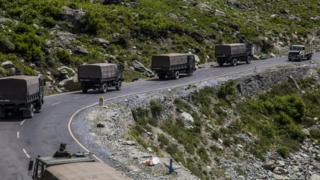 Image copyright Getty Images
Image copyright Getty Images India has vowed to defend its border with military force if necessary, after 20 of its soldiers were killed in violence with Chinese troops on Monday.
Prime Minister Narendra Modi says no foreign soldiers are inside Indian borders and no territory has been lost.
China has not released any information about its casualties since the clashes at the disputed Himalayan border.
The two nuclear powers accuse each other of crossing the poorly demarcated border and provoking the fight.
India has said that both sides suffered losses during the fighting in the Galwan Valley, in Ladakh.
In a televised statement on Friday, Mr Modi said that India’s armed forces had been “given a free hand to take all necessary steps” to protect Indian territory.
“The entire country is hurt and angry at the steps taken by China,” he said, adding: “India wants peace and friendship, but upholding sovereignty is foremost.”
Mr Modi went on to say that following Monday’s clashes, “neither is anyone inside our territory nor is any of our post captured”.
The fatal incident, which was fought without any firearms because of a 1996 agreement barring guns and explosives from the area, also reportedly injured at least 76 other Indian soldiers.
An image that emerged on Thursday purportedly showed some of the crude weapons used in the fight.
The photograph, which appears to show iron rods studded with nails, was passed to the BBC by a senior Indian military official on the India-China border, who said the weapons had been used by the Chinese.
The image was widely shared on Twitter in India, prompting outrage from many social media users. Neither Chinese or Indian officials have commented on it.
Media reports said troops clashed on ridges at a height of nearly 4,300m (14,000 ft) on steep terrain, with some soldiers falling into the fast-flowing Galwan river in sub-zero temperatures.
Why were there no guns?
The Galwan river valley in Ladakh, with its harsh climate and high-altitude terrain, is close to Aksai Chin, a disputed area claimed by India but controlled by China.
This is not the first time the two nuclear-armed neighbours have fought without conventional firearms on the border. India and China have a history of face-offs and overlapping territorial claims along the more than 3,440km (2,100 mile), poorly drawn LAC separating the two sides.
The last firing on the border happened in 1975 when four Indian soldiers were killed in a remote pass in the north-eastern state of Arunachal Pradesh. The clash was variously described by former diplomats as an ambush and an accident. But no bullets have been fired since.
At the root of this is a 1996 bilateral agreement that says “neither side shall open fire… conduct blast operations or hunt with guns or explosives within two kilometres of the Line of Actual Control”.
But there have been other tense confrontations along the border in recent weeks. In May Indian and Chinese soldiers exchanged physical blows on the border at Pangong Lake, also in Ladakh, and in the north-eastern Indian state of Sikkim hundreds of miles to the east.
India has accused China of sending thousands of troops into the Galwan Valley and says China occupies 38,000 sq km (14,700 sq miles) of its territory. Several rounds of talks in the last three decades have failed to resolve the boundary disputes.
Click Here to Visit Orignal Source of Article https://www.bbc.co.uk/news/world-asia-53114762


